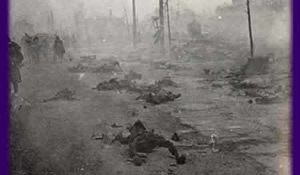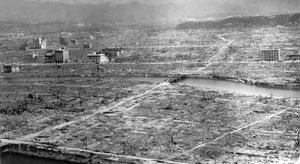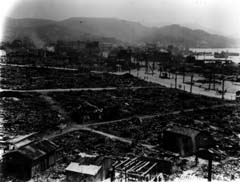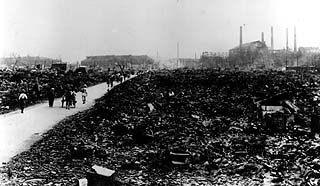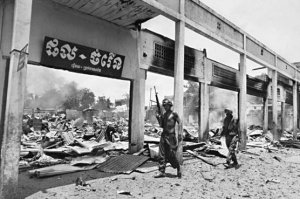From Israel:
Hezbollah also claimed to have fired a volley of rockets on northern Israel early on Thursday. Israel said one
woman was killed.
The killing of eight soldiers and the capture of another two by Hezbollah militants in fighting on the volatile
Israel-Lebanon border on Wednesday opened up a dangerous new front in the Middle East conflict.
… This was an act of war without any provocation on the sovereign territory… of the state of Israel,
said Olmert, facing the most serious test of his leadership since his government took office in May.
… Israel must respond with the necessary severity to this act of aggression… Israel will respond aggressively and harshly to those who carried out, and are responsible for, today’s action,
a cabinet statement said.
— News24 2006-07-13: Israel bombs Beirut airport
From Lebanon:
Fighter jets swooped in on the airport, firing missiles on two runways, forcing the diversion of flights to
neighbouring Cyprus and the closure of the newly renovated airport.
Lebanese police said 27 civilians, including 10 children, were also killed in a wave of Israeli attacks on the south on Thursday after the Hezbollah action that Israeli Prime Minister Ehud Olmert branded an act of war
.
— News24 2006-07-13: Israel bombs Beirut airport
So in Israel, one civilian was murdered. Eight soldiers were killed in combat and two captured. In the process of retaliating, Israeli forces have slaughtered 27 civilians, including 10 children, who had nothing in particular to do with the attack. They have bombed out bridges, destroyed roads, and bombed the country’s main airport (which had no connection with Hizbollah’s attacks and is far away from Hizbollah’s base of power in Southern Lebanon). They show no signs of letting up: this deaths and destruction is only the beginning.
From Israel:
JERUSALEM (AP) – Palestinian militants in the Gaza Strip fired three homemade rockets into Israel on Friday, hours
after the Israeli prime minister pledged to push forward with airstrikes against the militants despite a recent string
of civilian casualties.
The Israeli army said there were no injuries or damage from the rocket fire. But the attack prompted a
prominent legislator to call for Israel to launch a military offensive into the densely populated Gaza Strip.
Speaking Thursday evening at an economic conference in Jerusalem, Israeli Prime Minister Ehud Olmert
apologized from the depths of my being’
for civilian deaths in recent airstrikes in Gaza. But he added,
Israel will continue to carry out targeted attacks against terrorists and those who try to harm Israeli
citizens.
I am deeply sorry for the residents of Gaza but the lives, security and well-being of the residents of Sderot is no less important,
‘ Olmert said, referring to the southern Israeli town that has been pelted by rocket fire from Gaza.
—Steve Weizman, The Guardian (2006-06-23): Gaza Militants Fire Rockets at Israel
Palestinian militants have captured an Israeli soldier during a raid on an army post near the Gaza strip, the Israeli military has said.
The man went missing during an attack on an Israeli tank which killed two of its crew, a military spokesman said.
Hamas said it had knew nothing about the soldier, but urged any captors to keep him alive and treat him well.
Israel said it would do everything in its power to retrieve the soldier, the first to be captured since 1994.
—BBC 2006-06-25: Israeli soldier seized
in raid
A young Jewish settler seized by Palestinian militants in the West Bank has been found dead.
The body of Eliyahu Asheri, 18, from the Itamar settlement, was retrieved near Ramallah by the Israeli army.
—BBC 2006-06-29: Seized Israeli settler found dead
Israel has rejected criticism that its military offensive in the Gaza Strip is a disproportionate use of force.
PM Ehud Olmert said there was no other way to stop the fear, the shocks, the lack of security
of Israeli civilians facing daily rocket attacks from Gaza.
— BBC 2006-07-10: Israel denies excessive force
From Gaza:
Israeli warplanes also bombed the Palestinian foreign ministry in the Gaza Strip overnight in the latest offensive over the seizure of an Israeli soldier by Palestinian militants three weeks ago.
A total of 70 Palestinians have been killed in the military onslaught against Gaza, which the United Nations has warned is causing a humanitarian crisis in one of the most densely populated areas on earth.
—News24 2006-07-13: Israel bombs Beirut airport
The Israeli military said it attacked the home because it was a meeting place for terrorists.
It also
confirmed Israeli forces were operating in southern Gaza as part of an effort to win the release of a captured
soldier.
With tanks and troops on the move farther south, a huge explosion destroyed the house of Hamas activist Dr.
Nabil al-Salmiah, killing seven people, including two children, and wounding at least 24, hospital officials and
residents said. There was no immeidate word if al-Salmiah was among the casualties.
They said the house was hit by a missile fired from an Israeli plane. The Israeli military said it attacked the house
because it was a meeting place for terrorists
who were planning attacks and rocket-launching.
Palestinian rescue teams dodged broken water pipes and electricity wires searching the rubble with bulldozers,
shovels and their hands and to reach injured people screaming for help.
The scene resembled the aftermath of a 2002 attack, when an Israeli plane dropped a bomb on the house of a
Hamas leader in Gaza, killing him and 14 other people, including nine children. The attack set off complaints from
human rights groups that are still reverberating.
—Canadian Press (2006-07-11): Israeli air strike on Palestinian home in Gaza kills 7, injures 24
Four Palestinian civilians were killed and 15 injured in Israeli airstrikes on a three-storey building and a car in
northern Gaza City early Wednesday, witnesses and medics said.
Witnesses said that two successive airstrikes were carried out on Sheikh Radwan neighborhood in northern
Gaza City.
They said that one rocket hit a car that drove in the neighborhood, but militants aboard the car managed to escape
before the car was hit.
They said that a second rocket was fired at a three-storey building, which belongs to a Palestinian teacher at Islamic University in Gaza City called Nabil Abu Silmeya.
Medics at Shiffa Hospital in Gaza City said that four bodies were identified, two of them children, adding that 15 people were wounded.
—People’s Daily Online (2006-07-12): Four civilians killed in Israeli airstrikes on Gaza
At around 1.00 am on Tuesday, 4 July 2006, an Israeli Apache helicopter fired one missile at the Islamic University
in Gaza City. As a result of the attack, the target, a student council office, caught fire and was completely
destroyed. At approximately 1:50 am on Wednesday, 5 July 2006, an Israeli aircraft dropped a bomb on the Dar
al-Arqam School in al-Tuffah neighbourhood of Gaza City, destroying a number of classrooms. These attacks
came less than a week after the IAF fired a missile at the Islamic University, hitting a football field.
—Al-Haq Press Release (2006-07-06): Israeli Attacks on Educational Institutions in the Gaza Strip Violate International Law
PCHR strongly condemns the targeting of the Palestinian Interior Ministry building by Israeli Occupation Forces
(IOF) for the second time this week. In addition, the Centre condemns the military escalation against civilian
property and installations, including educational and governmental institutions that are essential to the daily lives of
the civilian population. The Centre warns against the continued targeting of these institutions, which will lead to a
complete collapse of basic services in the sectors of health, sewage disposal, transportation, education and
social services. …
Shortly after targeting the Ministry of Interior, IOF planes dropped another bomb on Dar Al-Arqam School in the
densely-populated El-Tuffah area of Gaza City. A number of structures and classrooms were destroyed. No
injuries were reported.
—Palestinian Centre for Human Rights Press Release (2006-07-05): Israeli Occupation Forces Destroy the Ministry of Interior Building and a School in Further Aerial Attacks on the Gaza Strip
GAZA, July 1 (Reuters) – Lutfi Halawa stood beside the hospital bed of his nine-month old daughter Isra, praying
power cuts hitting the Gaza Strip will not shut down her ventilator.
Without electricity my daughter will die,
he said.
Palestinian health officials say an Israeli air strike which knocked out Gaza’s main power plant has put the lives of
hundreds of patients in imminent danger.
The attack was part an Israeli offensive to free a soldier captured by Palestinian militants last Sunday. Israel,
which provides most of Gaza’s electricity, says it has boosted supplies because of the current situation.
But the United Nations and the International Committee for the Red Cross say the strike has cut vital electric power
for hospitals as well as families. Air strikes have also knocked out water supplies, they said.
Israel’s closure of Gaza’s borders has also halted commodities including gasoline, meaning the fuel Palestinians
are using to power home generators is being depleted.
Al-Naser hospital for children, where Isra is being treated, has been relying on a generator during power cuts.
But its gasoline reserve will only last four to five days, doctors say.
—Reuters (2006-07-01): Gaza power cuts endanger patients, doctors say
The decision to expand the the military operation in Gaza was made during consultations between Prime Minister
Ehud Olmert and Defense Minister Amir Peretz.
Our main target is the terrorist infrastructure — the rocket crews, the gunmen, the arms caches,
said an IDF commander.
But of course we are here to show that if, God forbid, any of us is captured by the enemy, the army will do
everything to secure his return.
IDF troops rolled into Gaza from the Kissufim crossing, once the main access point to Jewish settlements, and an
access road four kilometers to the south, menacing the nearby city of Khan Yunis and town of Dir al-Balah.
Palestinians said that IDF bulldozers were leveling farmland in the area, and the military ordered Palestinian
security forces to leave their forward positions.
— Ha’aretz (2006-07-13): U.S. vetoes UN resolution condemning Israel’s Gaza incursion
So in Israel, one civilian was murdered, two soldiers were killed in combat, and one captured. Residents of towns near the Gaza strip have suffered some fright and some property damage from poorly-aimed rocket attacks. In the process of retaliating, Israeli forces have killed some 70 people, many of them children or other civilians who had nothing in particular to do with the attacks. They have also deliberately torn up farms, bombed bridges, destroyed school buildings, and the main civliian power plant. They show no signs of letting up: this death and destruction is only the beginning.
The murder of civilians by Palestinian or Lebanese terrorists is criminal, and those who committed the murders can be stopped from committing further crimes through the use of violence, if necessary. But the right to use force against someone does not mean the right to use any amount of force necessary against anyone at all in the process of stopping her. It’s true that if you really are willing to do everything
in retaliation for the kidnapping of a soldier, or attacks on your forces, or attacks on civilians, then this is included. Any atrocity at all is included in doing everything,
and that is precisely why the willingness to do everything
in retaliation for an attack, no matter what the cost to innocent third parties, is a moral crime of the first order. Destroying the lives and livehlihoods of scores of innocent people in the process of trying to stop the murder of one or two other innocents is criminal. Destroying the lives and livelihoods of scores of innocent people in the process of trying to avenge the death or capture of a handful of soldiers in combat — the primary justification given by the Israeli government for these campaigns — is nothing less than an atrocity.
Further reading:
